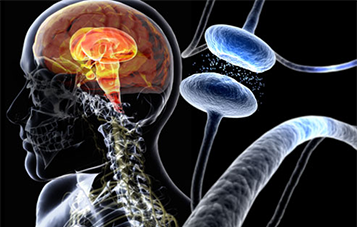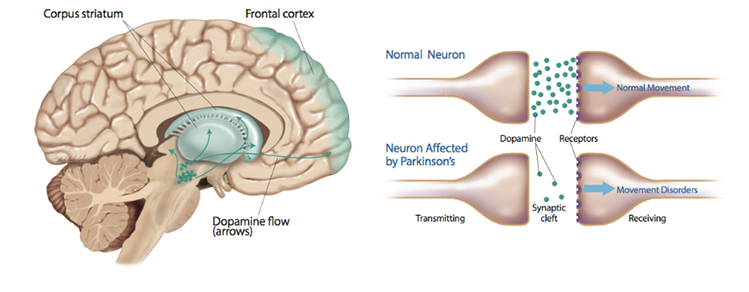Parkinson's disease

Parkinson's disease is a slowly-progressive neurodegenerative disease, the second among most common problems of the central nervous system after Alzheimer's one. It occurs in about 1% of the population over the age of 65, and 0.4% over the age of 40 years. The average age of onset of the disease is about 57 years, but sometimes the illness can begin at a younger age, even in childhood (juvenile Parkinsonism).
The first symptoms appear after the death of certain cells of the brain, so-called dopaminergic neurons, which results in reduced production of dopamine, responsible for transmission of nerve impulses between different sections of the brain, nerve-endings and muscles that normally allow you to control your body. The illness develops slowly, and the first symptoms may not be noticeable.

The first symptoms of Parkinson's disease can be the following:
- Easy fatigue and malaise;
- Disruption of the gastrointestinal tract (constipation);
- Involuntary urination (especially at night);
- Sleep disorders;
- Fatigue and depression;
- Pain in muscles and joints;
- Movements of arms and legs when asleep;
- Deterioration of handwriting;
- Cognitive impairment - loss of activity and initiatives in speech and emotions ("hard to switch the thoughts").

Unfortunately, to such clinical manifestations are rarely paid attention to as the beginning of a complex illness, in addition, very often these symptoms are explained by other concomitant illnesses.
Classical manifestations of the disease are:
1) hypo- or akinesia - slowness and poverty of movements and facial expressions;
2) tremor in the limbs;
3) muscle rigidity (stiffness).
Slowness and stiffness are the main symptoms of the disease, the reason for which is a quantitative deficiency of dopamine. Tremor is a secondary, but the most noticeable symptom and its appearance indicates already large enough loss of nerve cells. Most prognoses in the treatment of Parkinson's disease by conventional methods are unfavorable. Drug treatment is only symptomatic and, even when the therapy is properly selected, the disease has a tendency to progression. In addition, according to the latest data of World Medicine, it is proved that the levodopa drugs can destroy dopamine-containing brain cells and thus to accelerate the progression of the disease.
Stem cells treatment of Parkinson's disease is directed to improve the nervous system, as well as to normalize the immunity (microimmunotherapy), which leads to a gradual restoration of dopamine-containing cells. Fetal stem cells are the only source of neuroectodermal stem cells and therefore have the strongest regeneration potential for the damaged neurons. As the number of dopamine-containing cells increases, gradual decrease in disease symptoms occurs in a patient.
After treatment by Prof. Smikodub's method, a powerful immunotherapeutic effect is observed. It is aimed at correcting chronic diseases improving general health condition and positively influences the quality of life of the patient and his/her family. Success rate after our treatment with fetal stem cells in the UCTC is different in each patient and depends on the duration of the disease and the initial degree of patient’s disability.
After fetal stem cell treatment, the following improvements are seen most commonly in patients with Parkinson's disease:
 |
Reduction of fatigue, enhancement of life quality, increase in physical activity |
 |
Elimination of problems with gastrointestinal tract and urination |
 |
Improvement of mobility, increase in the amount of active movements of the limbs, reduction of tremor, better handwriting |  |
Improvement of sleep and cognitive functions, speech enhancement, decrease of depression symptoms |
